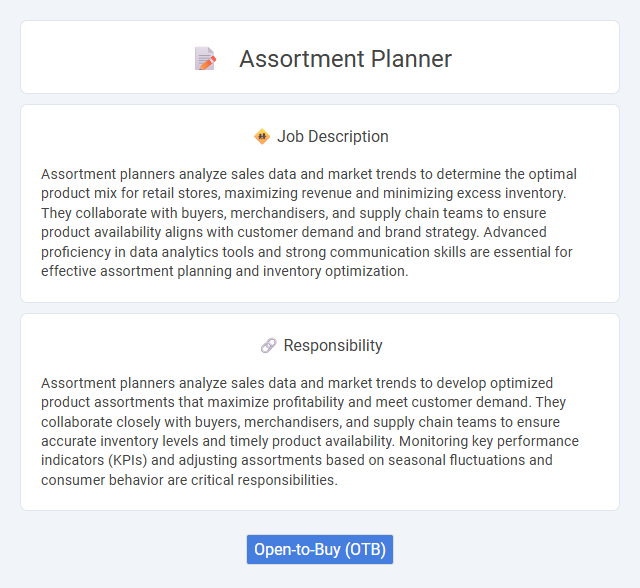
Assortment planners analyze sales data and market trends to determine the optimal product mix for retail stores, maximizing revenue and minimizing excess inventory. They collaborate with buyers, merchandisers, and supply chain teams to ensure product availability aligns with customer demand and brand strategy. Advanced proficiency in data analytics tools and strong communication skills are essential for effective assortment planning and inventory optimization.
Individuals with strong analytical skills and attention to detail are likely suitable for an assortment planner job, as the role demands evaluating sales data and market trends to optimize product selection. Those who prefer dynamic environments and can handle pressure while maintaining accuracy may probably succeed in this position. However, people who struggle with multitasking or have difficulty adapting to fast-paced decision-making might find this job less fitting.
Qualification
Assortment planners typically require a bachelor's degree in supply chain management, business administration, or a related field, accompanied by strong analytical skills and proficiency in data analysis tools like Excel and SQL. Experience in retail merchandising, inventory management, and demand forecasting is essential to optimize product mix and maximize sales. Familiarity with ERP systems and a solid understanding of market trends and consumer behavior further enhance qualification for effective assortment planning.
Responsibility
Assortment planners analyze sales data and market trends to develop optimized product assortments that maximize profitability and meet customer demand. They collaborate closely with buyers, merchandisers, and supply chain teams to ensure accurate inventory levels and timely product availability. Monitoring key performance indicators (KPIs) and adjusting assortments based on seasonal fluctuations and consumer behavior are critical responsibilities.
Benefit
An assortment planner likely enhances inventory efficiency by predicting consumer demand and optimizing product variety, which reduces excess stock and stockouts. There is a strong probability that this role contributes to increased sales and customer satisfaction through strategic merchandise selection. Employers probably benefit from improved profitability and streamlined supply chain operations due to the planner's accurate forecasting and analysis.
Challenge
Assortment planner roles likely involve the challenge of balancing customer demand predictions with inventory constraints to optimize product variety and availability. Managing fluctuating market trends and supplier lead times may complicate accurate forecasting and assortment decisions. Effective communication across departments is probably essential to address these challenges and ensure seamless product assortment execution.
Career Advancement
An Assortment Planner plays a crucial role in retail by analyzing market trends and customer preferences to optimize product selection and inventory levels. Mastery in data analytics, supply chain coordination, and merchandising strategies leads to career advancement opportunities such as Senior Planner, Merchandise Manager, or Category Manager roles. Developing strong skills in forecasting, vendor negotiation, and business intelligence tools significantly enhances promotion prospects within fashion retail or consumer goods companies.
Key Terms
Open-to-Buy (OTB)
Assortment planners play a critical role in managing Open-to-Buy (OTB) budgets to ensure optimal inventory levels and maximize sales potential. They analyze sales data, forecast demand, and allocate budgets to maintain a balanced product mix while minimizing excess stock and markdowns. Effective OTB management by assortment planners drives profitability and supports strategic buying decisions in retail environments.
 kuljobs.com
kuljobs.com